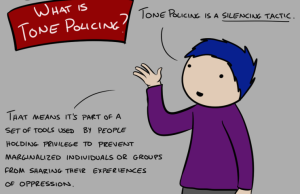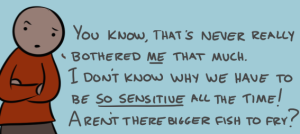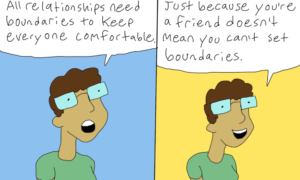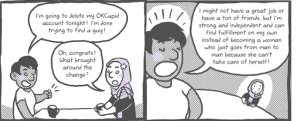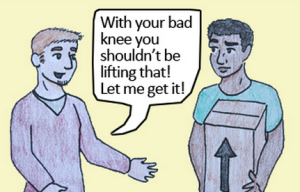
Source: Ofcom
Among people in marginalized communities, you’ll often hear talk of “passing.”
Passing refers to instances in which a person, usually a minority, is falsely assumed to be a member of the majority.
For example, a queer person might pass as straight, a person of color might pass as white, or a transgender person might pass as a cisgender person.
Passing is highly circumstantial and could be intentional or unintentional. Some people want to pass; others actively try not to pass.
In general, the biggest source of debate about passing tends to be the privileges that those who pass could receive and whether or not the desire for or enjoyment of these potential benefits reflects internalized shame or confirms the superiority of the status quo.
Physical disability creates an especially unique situation because you almost never have the opportunity to pass.
Personally, even if I didn’t use my wheelchair, you would still be able to tell that I had some sort of disability due to other superficial markers, such as my pattern of speech and the way that I hold my body.
Although I’ve never aspired to pass as able-bodied, the social stigmas that come along with instantaneously being read as disabled do start to wear you down after a while.
Luckily, I’ve always had a reliable haven from ableism – the Internet.
Virtual Passing
I’ll be up front with you: I absolutely love passing on the Internet.
It has nothing to do with feeding any kind of inferiority complex. Admittedly, as a young teen, I used to get a big rush off of “tricking” people into thinking I wasn’t disabled by omission, which was a result of me nursing my own insecurities.
Now, I just see it as the equivalent of taking off a really uncomfortable piece of clothing at the end of every day.
I find that one of my most prevalent social obstacles face-to-face is my voice because of the connections that people make between my pattern of speech and assumed lack of mental or intellectual capacity.
You can’t really have a mature discussion with peers when people react to you as if you’re five years old. You can also forget about discussing romance and sex without a flurry of amused and patronizing condescension.
Going online is one of the rare times when I’m on an equal social playing field. My opinions and perspectives can operate independently of unconscious prejudice.
Sure, I’ve had moments where I’ve felt as though I’m somehow betraying the disabled community by not mentioning that I have a disability. But then again, what defines a “good” member of a community?
Is it my responsibility by virtue of being a disabled person to constantly alert everyone to my disability or else be considered ashamed or dishonest?
Why is that my burden if it’s completely irrelevant to the context of the situation and I pass so rarely anyway?
I decided that it didn’t matter as long as I wasn’t perpetuating ableism and continued blogging without explicitly disclosing my disability.
‘Outing’ Myself as Disabled
Inevitably, I found myself in a situation where I had to make a choice.
What’s really fascinating to me is the fact that if it were any other medium, I wouldn’t even have the option not to out myself as disabled.
It’s a rare instance of agency for me, but I just as quickly realized that it was a decision I didn’t particularly want to focus on.
I spend most of my time on Tumblr, a website known for its progressive social attitudes. While many users are adept at calling out issues with regard to the stigma around mental illness, the exploration of ableism in the context of physical disability remains comparatively limited.
Nonetheless, some of my followers began to ask me some basic details about my life, so the time came when I felt comfortable enough to mention that I was in a wheelchair. It was fairly off-the-cuff and I considered it an afterthought.
The response was positive and well-intentioned, but made me incredibly uncomfortable.
I received a flurry of messages reassuring me that I was beautiful in spite of my wheelchair. (The context was that I had humorously referenced my disability as a justification for why I was single, which was probably wasn’t the best way to introduce my disability to a largely able-bodied audience.)
Putting aside the fact that beauty has no bearing on relationship status, I was very concerned with the rapid shift in the way people reacted to me.
Whereas my followers had previously complimented me on my appearance point blank, now they took it upon themselves to declare that I was “still” beautiful.
What is it about disability that forces us to qualify beauty?
I said that I was disabled. Period.
I did not use it as evidence of insecurity and I certainly wasn’t fishing for able-bodied approval.
Beyond being patronizing, some of the reaction was just plain weird. I had clarified in a later post that I had cerebral palsy, and a girl messaged me and explained that she was glad that I seem to be thriving because she knew someone with CP who had passed away as a child.
Even at the most innocuous level, people still feel entitled to say incredibly triggering things like the above. This is why we need to talk about ableism more.
It’s never okay to link someone’s diagnosis to tangential stories of suffering and death. You’re either making them feel guilty about their comparatively good situation or unnecessarily terrifying them about the future. Not to mention that it’s the pinnacle of distaste.
You wouldn’t say, “Hey, I saw that you’re blonde. I’m amazed you’re still alive because I had blonde friend who died. I thought all blonde people were doomed, good for you!”
Knowing someone’s medical condition does not give you the authority to make presumptions about their health or quality of life, let alone generalize these views to apply to the entire group.
My blog had devolved from a platform of empowerment into a series of progressively more embarrassing and unsolicited pats on the back.
I was beginning to remember why I had enjoyed passing so much.
‘Benign’ Ableism
Ableism can be tricky to address because it’s one of the most nebulous -isms.
You generally associate other -isms (e.g. racism and sexism) with hate, prejudice, and bigotry.
In contrast, the vast majority of ableism stems from misguided attempts to help or cheer up disabled people.
Since the motives are relatively innocent, it can be difficult to draw the line between kindness and offensiveness.
Ableism can therefore be dismissed very easily. You wouldn’t want to be the bitter cripple rejecting the generosity of others and playing the victim all the time.
Due to this internalized fear, I immediately began blaming my sour reaction on myself.
I have posted plenty of selfies, but never one that showed my chair. Did that give the impression that I was ashamed of my disability?
The last thing that I would want is for other people in the disabled community online to think that I resented being handicapped or that I was intentionally trying to pass as able-bodied because I felt superior.
However, it’s true that I did present one thing: the able-bodied appropriation of my self-acceptance.
When I announced that I was disabled, it was as if I abdicated my right to having an opinion about myself. My attractiveness and self-worth moved out of my control and apparently now hinged on the approval of able-bodied folks.
Disabled people don’t need able validation to dictate how they should feel about themselves.
By implying that they do, the able-bodied are basically confirming that they see us as socially inferior.
My disability should not be a scarlet letter. I shouldn’t have to apologize for it.
I’m still the same person with the same thoughts and emotions. I just have slightly different circumstances.
Passing Is Up to You
In the end, I wrote an official post detailing my disability that served as a short, sassy rebuttal to the comments. I hope that people’s perspective of me will remain the same as it was, but I suppose time will tell.
Overall, my stance on the ethics of passing online while disabled remains ambiguous.
I don’t think there’s anything wrong with acting according to your personal preference or judgment.
With that said, you shouldn’t look down on anyone who doesn’t make your choice.
If you want to make your disability known, go ahead! It’s a really important part of our lives and you should feel proud to embrace it.
If you want to pass, rock on! It’s nice not to have to deal with ableist bullshit once in a while and you might discover a whole new side of yourself.
No matter what you decide, remember that your disability doesn’t define you – online or offline.
[do_widget id=”text-101″]
Want to discuss this further? Login to our online forum and start a post! If you’re not already registered as a forum user, please register first here.
Erin Tatum is a Contributing Writer at Everyday Feminism. She’s a feminist, queer theory lover, and television enthusiast living in Pennsylvania. She is particularly interested in examining the representation of marginalized identities in media. In addition to Everyday Feminism, she’s also a weekly contributor to Bitch Flicks. Follow her on Twitter @ErinTatum91 and read her articles here.
Search our 3000+ articles!
Read our articles about:
Our online racial justice training
Used by hundreds of universities, non-profits, and businesses.
Click to learn more
Most Read Articles
- « Previous
- 1
- …
- 30
- 31
- 32






